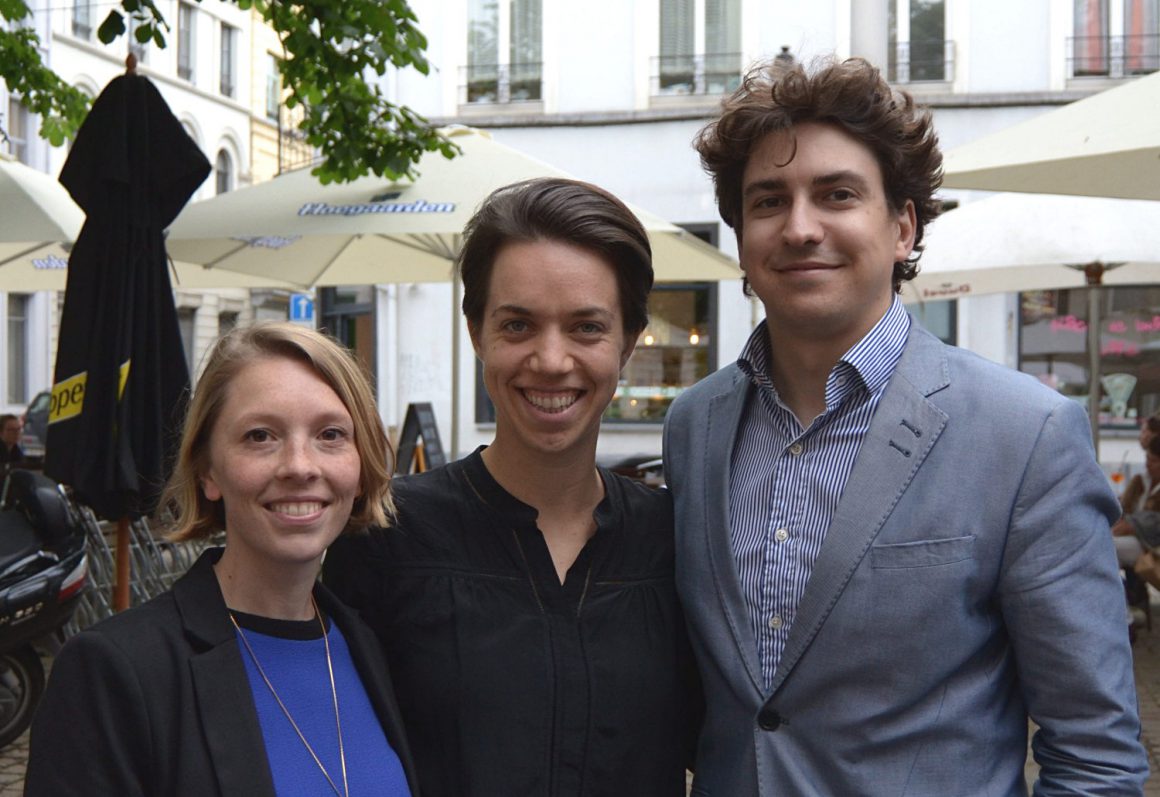Would the British vote to leave the EU had there been a pan-European public sphere? Would nationalist and populist arguments have the same appeal in Britain and other European countries? An interview with the realists behind Politix EU
Politix EU is an internet platform that presents the most recent proposals of EU legislation. The content of the bills is described in a nutshell and supplemented with a clear visual presentation of the positions of various lobbyist organizations, as well as the votes of Members of the European Parliament (MEPs). Politix EU also encourages users to take an own stance on the issue and vote – thumbs up or thumbs down – directly on the website.
I met Maria Lastovka (29), Fabian Fechner (28), and Lea Pfefferle (28), who live and work in Brussels, in a café on Place de Londres. Johann Steinbrecher (30) connected via Skype from San Francisco, from where he runs the technical side of the project. The guys, all Germans, have full-time jobs and do Politix EU “for fun.”
What is the idea behind your project?
Fabian: Plainly put, our vision is to make representative democracy at the EU level work better.
Maria: We feel that there is a gap in the feedback-loop between the European citizens and the EU decision makers. Citizens often do not understand what the EU does and politicians are not aware of the political sentiment out there.
This is something the EU is thinking about at the moment. What do you think about it?
Lea: So we want to explain legislative proposals currently going through the European Parliament (EP), the European Commission, and the Council in clear language.
Maria: We say: “Look, this is something the EU is thinking about at the moment. What do you think about it?” Also, there is very little transparency as to what other stakeholders are actually involved in the legislative process: lobbyists, NGOs, etc.
Lea: Additionally, the ‘What Do People Think’ feature collects and shows the votes of our website’s visitors according to their country. That should create an additional incentive for national politicians but also make clear that there can be an entirely different sentiment about an issue in Germany than, say, in Greece.
Maria: Another motive was to make a better use of digital technology, create something beautiful in the information space of EU politics, organise it differently. And Johann was always saying that communication-wise Silicon Valley has cooler ideas than Brussels.
News stories are mixed with folklore. In order to understand EU politics one needs to go to its materialized output.
Johann: I’m a computer scientist and so, unlike the others, an outsider to politics and journalism. But I’ve always been interested in how stuff works: how electrons run in cables, how atoms interact, how instructions flow through my computer processor, how pixels get rendered on my screens. And I know how to sort these questions out.
But when it comes to political systems I felt that my hands are tied. You can switch on the TV or open a newspaper, but you find nothing but news stories. My feeling is that the information I find there is rarely concrete or objective and way too often mixed with… well, folklore. In any case, it doesn’t help me. This brought us to the conclusion that, if one wants to understand EU politics, one needs to go to its materialized output – the bills, the written legislation, – to zoom into and find correlations, agreements, and disagreements.
This way one approaches politics and democracy in a more sober, honest, but also easy-to-understand fashion. One can even see through traditional party affiliations. Who cares whether you are a conservative, social democrat, or green? What matter is your relation to concrete legislative proposals.
How did you meet and how was the idea born?
Fabian: Maria, Lea, and I were studying together at the London School of Economics and Political Science (LSE) in 2012. Johann was introduced into the team by Maria. Simon Hix, the co-founder of Vote Watch Europe, was our professor. Let’s say, he inspired us. We had a course about the EP with him, which was very detailed, data-driven: committees, votes, political groups, etc. He was very enthusiastic. It was probably my favourite course.
Johann: But it all started with us saying: “Hey, guys, let’s do this! It’s possible and, in fact, it’s easy.”
Fabian: We started working on it, Johann built the initial platform, we were gradually filling it with content, showing it to friends and colleagues. And in October 2014, the project was launched under the original name “Thumbs of Europe”. But this name wasn’t catchy and, using the funding we received from Advocate Europe, we eventually re-branded.

Johann in San Francisco (photo: Skype)
How does the work behind the scenes look like? Where do you get your data?
Maria: Fabian is primarily the one who checks the EP’s website for new proposals, but, in the end, almost everybody is involved in writing the content. Since we are coming from different backgrounds, that’s the way to make our presentation as balanced as possible.
Lea: The positions of the lobbying organizations are also introduced manually at the moment. We then categorize them as for or against the legislative proposal at hand. However, we must be very careful with such categorizations. Once the Association of European Airlines (AEA) contacted us on Twitter. They did not agree with our labelling of their position on the EU Aviation Strategy. They said that they weren’t really against the proposal and that their position is a more nuanced one. Also, we don’t have a grey box – neither for, nor against – because in that case all of the lobbyists’ positions would fall into it.
Fabian: But we are open to discussions about our categorization. Of course, we’re not going to change it simply because somebody says it’s wrong; they need to justify it. Some organizations even contacted us asking whether they can upload their position by themselves. So, the ‘lobbyist login’ feature is on our to-do list.
The EU voting data is actually fed into the system from Silicon Valley.
The MEPs’ voting data is made available on the Parliament’s website. Yet, the EP does not always seem very eager to share the data. Sometimes, they’d have it only as PDF, which is useless for us. That’s why we usually get the data from Parltrack, an organisation that publishes the voting data in a machine-readable format, which we then send to Johann. So the EU voting data is actually fed into the system from Silicon Valley.
So, unlike Vote Watch, you do not offer a statistically representative analysis.
Fabian: That’s right. It’d be difficult to say that we have a strictly scientific approach. Vote Watch covers everything, while we select the bills that we think would be most interesting for people…
Making unreadable legislative text comprehensible – it can be done.
Johann: It is true that our content is curated and involves a certain subjective filter. We don’t have the ambition to always be scientifically correct. But it’s our way to make unreadable legislative text comprehensible. The good news: it can be done. We break the bills down to bite-size and show how positions correlate. One can see, for example, with which lobby organizations an MEP agrees or disagrees most. This way we both engage citizens as well as make the mechanisms of politics visible.
Who is your target audience?
Lea: In principle, the target group is all Europeans. If it was up to us, that’s who we’d be talking to. More realistically, however, we decided to focus on young Europeans. We are collaborating with some youth and student organizations: for example, the European Student Think Tank, the Student Forum Maastricht.
The second target group are people in Brussels, because we think Politix EU could be a useful tool for their work, at least to get the first overview of a specific legislative proposal. Now, we know it as a fact that Politix EU is used as one-stop-shop. After all, Politix EU shows the bill, what it means, and the relevant lobbying positions on a single page.
Johann: Some time ago Fabian was in a meeting at the EP, where he accidentally met an assistant that had print-outs from our website with him. The print-outs did not look that great, because we don’t have a proper printing view yet. But evidently, that assistant found the content valuable nevertheless. That was kind of cool to realize that EP employees actually use Politix EU in their daily work.
In the course of the years, we have gathered an impressive database of bills, lobbying organizations, parliamentarians, and their positions.
Fabian: In that aspect, Politix EU is very unique. In the course of the last three years, we have gathered an impressive database of bills, lobbying organizations, parliamentarians, and their positions, which anyone can browse through.
Johann: And you can see the correlations. To me personally, it definitely gives a clearer understanding of what is going on.
What challenges are you facing?
Fabian: One big issue for us is the language barrier. One tends to overestimate the spread of English – even among young people. That’s also why part of the concept has been to keep the info short. But we still often feel that translation to other European languages is missing. But, at the moment, we cannot provide it due to limited resources.
Lea: Another challenge is to bring more people to our website and to make them vote in order to make the user opinion data more credible.
Johann: So currently, our main audience is between 25–40 years old. Also, these are predominantly people who have been living abroad or otherwise involved with European thinking. Obviously, there are also many people from the Brussels-bubble. Again, Politix EU is received quite well within the bubble, but it’s always difficult to actually burst the bubble.
Maria: We’ve been using social media to promote our project, but it’s difficult. European politics isn’t as trendy as kittens. [laughs]
Any plans for the future?
Johann: At the moment, the bulk of the technical load is on me.. So I would love to get more developers and beta-testers involved. That way we’d be able to try more features and see what attracts more people.
Fabian: We rely on an ever growing network of volunteers: some help with the content, some code, others work on design. And we are continuously looking for new contacts. We believe in the project and we’ll try to run it as long as we can. The very long-term vision is to have a platform that one can expand to other countries or regions: Politix US, Politix Asia, …
Maria: … Politix Deutschland. [laughs]



